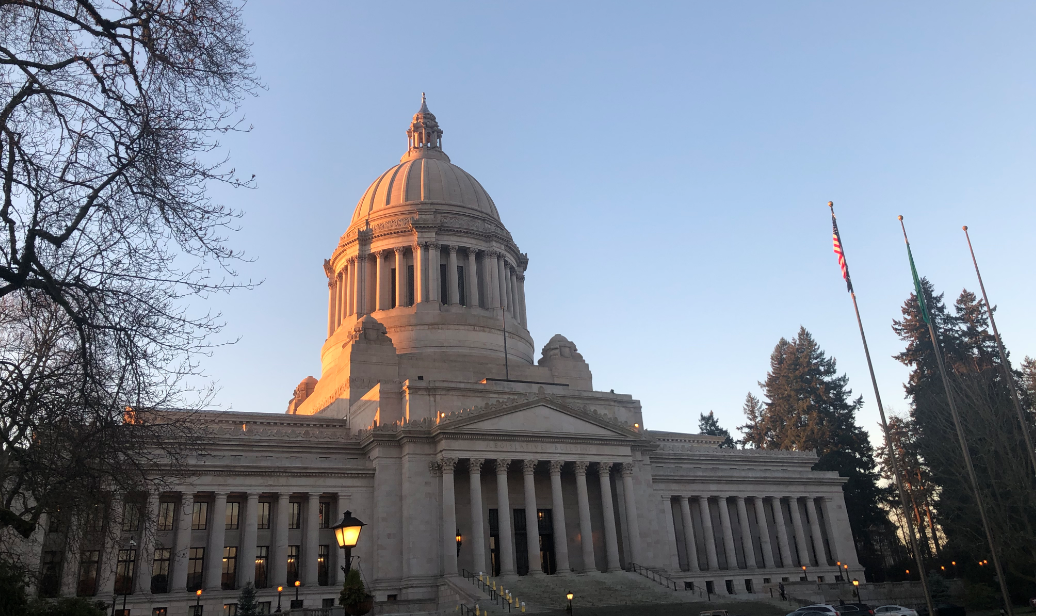On a recent episode of TVW’s “The Impact,” hosted by Mike McClanahan, former Democratic Speaker of the House, Rep. Frank Chopp and House Republican budget leader, Rep. Drew Stokesbary discussed their divergent approaches to legislating for Washington State’s economic recovery.
The discussion with both legislators occurred on the heels of a state revenue forecast which projected an $8.8 billion budget shortfall over the next three years, the unveiling of Chopp’s $2 billion revenue proposal, and ongoing calls from legislative Republicans for a June special session to begin spending cuts before the next fiscal year begins.

The Morning Wire: Keeping you informed on politics, policies, and personalities of Washington State.
Chopp was confident that his caucus would be supportive of his revenue proposal given the strain on childcare and early learning centers caused by the pandemic. After unveiling his proposal earlier this month, Chopp told the Wire that these centers were already in a precarious position before the pandemic hit, and that an alliance of childcare centers has warned him that several centers are now on the verge of collapse.
On the revenue shortfall, Chopp encouraged onlookers to think about the $8.8 billion figure in the context of the funding sources, and possible future funding sources, the state has at its disposal.
The budget stabilization account, commonly referred to as the state’s “rainy day fund,” has about $3.5 billion in it, which can help the state get through the next year or so. The $8.8 billion shortfall does not assume the state will tap into the budget stabilization account, nor does it account for additional federal funds that may be coming down the pike this summer.
To avoid a repeat of the austerity cuts the state made during the Great Recession, Chopp said raising additional revenue will be imperative.
To raise this additional revenue, Chopp has proposed a corporate payroll tax on annual incomes over $500,000, which would bring in about $500 million per year. He refers to these new taxes as a “fair share contribution.” The proposal also includes a capital gains tax.
Unlike like 2008 when the state did make significant cuts, Democratic legislators are no longer inhibited by a two-thirds majority vote requirement to raise taxes – the exception being an income tax that exceeds 1%, which still requires a two-thirds vote in the Legislature followed by a majority vote at the ballot box.
Chopp notes that several corporations have not seen their bottom line take a hit during the pandemic. Seattle-based Amazon’s net sales rose to $46 billion in the first quarter of the year, up from about $36 billion for the same period last year.
By contrast, Stokesbary pointed out that companies like Boeing, whose primary operations were stinted during the pandemic, have suffered.
On top of making the state less dependent on its 10% sales tax, Chopp also maintained that businesses would benefit from increased investment in childcare for their workers. All together, Chopp thinks raising the additional revenue and investing it back into communities around the state will spur economic recovery.
Stokesbary underscored his position that now is not the time for new tax increases. To make his case, Stokesbary pointed to the budget woes in Oregon and California – two states with both an income tax and a capital gains tax – as an indication that Washington State will get through the economic downturn in better shape without new taxes.
A lot of difficult, uncomfortable, and frankly unpopular decisions lie in front of us, but when each of us ran for the Legislature we didn’t run for the accolades or to do the easy things. We ran to do the hard things,” said Stokesbary. “There’s simply no way to balance our current incoming tax collections against all of the spending that we’ve promised people to date. So we’re going to have to cut back on a lot of spending we had previously agreed to.”
Rather than entertaining proposals to avoid cuts by raising additional revenue via new taxes, Stokesbary said his caucus is focused on halting the spending growth approved by the Legislature in recent years. Doing so, according to Stokesbary, would mean prioritizing vital services that already exist rather than new spending approved during the last session.
Gov. Inslee has already vetoed $235m in new spending from the 2020 session and directed state agencies to cancel a scheduled 3% general wage increase for nearly 5,600 general government employees.
Nevertheless, Stokesbary pointed out the raise cancellation applies mainly to the highest paid government employees and would not affect higher-ed employees, who are comparable in numbers to general government employees.
Specifically, Stokesbary is in favor of aligning spending with revenue levels from two years ago. He did acknowledge that avoiding a corporate payroll tax could be challenging given that corporations including Amazon, Microsoft, and Expedia came out in favor of a payroll tax this past session.
Your support matters.
Public service journalism is important today as ever. If you get something from our coverage, please consider making a donation to support our work. Thanks for reading our stuff.



